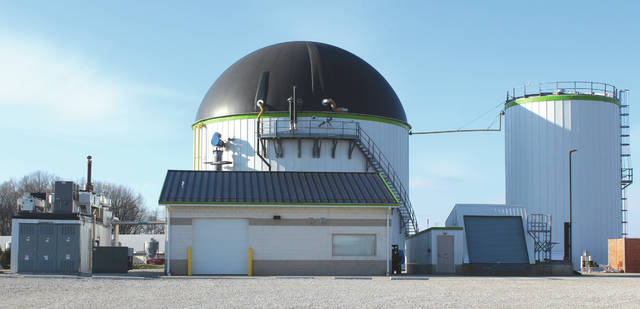
BATH TOWNSHIP — Bath Township residents Ron and Kassie Lester, along with their attorney, Richard Sahli, appeared at the Greene County Auditor’s Office June 18 to challenge the current tax value placed on a township parcel that houses a biodigester facility.
The Greene County Auditor’s Board of Revision scheduled the hearing after Kassie Lester filed a Complaint Against the Valuation of the Real Property, owned by Pitstick Renewable Energy LLC, with the board in February. Lester’s complaint asserts that the parcel, located at 1156 Herr Road, is not entitled to the tax benefits of the state’s Current Agricultural Use Valuation (CAUV) program.
The Ohio CAUV program allows farmland, devoted exclusively to commercial agriculture, to be valued based on the agricultural use of the land rather than its highest and best potential use. This state income tax credit has resulted in a substantially lower tax bill for working farmers.
To qualify for the CAUV program, farmers must devote 10 acres or more of land exclusively to agriculture use. Parcels less than 10 acres in size are also eligible for CAUV valuation if the parcel produced an average gross income of at least $2,500 during the last three years. Farmers must also file a renewal application annually to continue in the CAUV program.
According to Lester’s complaint, the CAUV renewal application filed for 2017 on the parcel did not disclose the fact that Pitstick Renewable Energy LLC had leased the land to Dovetail Energy LLC, a subsidiary of Renergy, Inc. Sahli, a Columbus attorney, pointed out to the board that an anaerobic digester was built on the leased parcel in 2013 and has permits issued by the State of Ohio that govern its operations.
Sahli submitted a copy of an aerial photograph of the parcel, which was obtained from the auditor’s website, that showed a 5-million gallon lagoon storing waste sludge from the facility, and approximately 7.3 acres of cropland. Yet, Sahli said the CAUV application form indicated that 11 acres of the parcel is cropland.
Under Ohio law, the parcel of land where the anaerobic digester is located is entitled to CAUV treatment only if at least 50 percent of its feedstock was derived from land devoted exclusively to agricultural use that is under common ownership or leasehold. However, Sahli submitted copies of documentation the Dovetail facility filed with the State of Ohio which established that the company is using less than 10 percent agricultural material as feedstock for the biodigester.
Sahli said records obtained from the Ohio EPA, detailing the facility’s feedstock in 2018, revealed that agricultural products constituted less than 1 percent of the facility’s feedstock to date. He also provided a copy of a brochure that Renergy distributed at a public meeting in Greene County before the anaerobic digester was built.
“The brochure has a diagram in the upper right corner plainly stating that its anaerobic digester uses 5 percent animal manure, 25 percent biosolids, and 70 percent food wastes,” said Sahli.
Sahli pointed out that the Ohio EPA has classified the Herr Road facility as an “industrial” not an “agricultural” operation. He also submitted a copy of a property card from the Morrow County Auditor’s office. The card showed that a similar biodigester plant in Morrow County, operated by Renergy Inc., does not receive CAUV valuation and has a far higher appraised value.
Sahli concluded by asking the board of revision to approve Lester’s complaint, properly classify the parcel as not being entitled to CAUV status, assess the land as commercial property, and make a proper recoupment of the CAUV tax savings after the conversion of the parcel, as provided in ORC 5713.34.
Kerry Boyle, attorney for Tom Pitstick and Pitstick Renewable Energy LLC, objected to all the exhibits Sahli presented to the board of revision, stating that the documents were hearsay or irrelevant. Sahli responded stating that he had researched in detail the origin of all the documents. The Ohio EPA documents were obtain through public records requests, and other documents were authenticated by affidavits.
Boyle asked the board to dismiss Lester’s complaint, citing that the complaint was not notarized under oath, and Lester is a neighboring property owner, not the owner of the parcel. However, Sahli stated that any property owner in the county is authorized to submit a complaint regarding any parcel in the county. Lester also told board members that Greene County Auditor David Graham had told her that her compliant did not require notarization, and Graham corroborated her claim.
Pitstick, who owns the property where the biodigester is located, conveyed to board members that wheat, corn, and soybeans were grown on approximately 9.5 acres of the parcel over the last three years, and those crops rendered an estimated income of slightly more than $7,000 per year. Pitstick said he would have to refer to Dovetail Energy LLC’s records to determine the percentage of feedstock derived exclusively from agricultural materials that was used in the production of methane gas at the biodigester.
Graham said once the board has rendered its decision, it will mail a final appealable order to the parties with the board’s decision.


